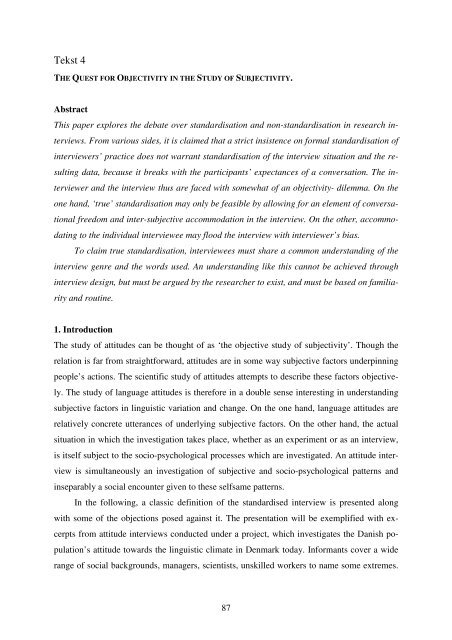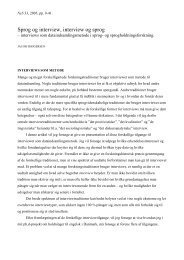Hør dog hvad de siger - Note-to-Self: Trials & Errors
Hør dog hvad de siger - Note-to-Self: Trials & Errors
Hør dog hvad de siger - Note-to-Self: Trials & Errors
You also want an ePaper? Increase the reach of your titles
YUMPU automatically turns print PDFs into web optimized ePapers that Google loves.
Tekst 4<br />
THE QUEST FOR OBJECTIVITY IN THE STUDY OF SUBJECTIVITY.<br />
Abstract<br />
This paper explores the <strong>de</strong>bate over standardisation and non-standardisation in research in-<br />
terviews. From various si<strong>de</strong>s, it is claimed that a strict insistence on formal standardisation of<br />
interviewers’ practice does not warrant standardisation of the interview situation and the re-<br />
sulting data, because it breaks with the participants’ expectances of a conversation. The in-<br />
terviewer and the interview thus are faced with somewhat of an objectivity- dilemma. On the<br />
one hand, ‘true’ standardisation may only be feasible by allowing for an element of conversa-<br />
tional freedom and inter-subjective accommodation in the interview. On the other, accommo-<br />
dating <strong>to</strong> the individual interviewee may flood the interview with interviewer’s bias.<br />
To claim true standardisation, interviewees must share a common un<strong>de</strong>rstanding of the<br />
interview genre and the words used. An un<strong>de</strong>rstanding like this cannot be achieved through<br />
interview <strong>de</strong>sign, but must be argued by the researcher <strong>to</strong> exist, and must be based on familia-<br />
rity and routine.<br />
1. Introduction<br />
The study of attitu<strong>de</strong>s can be thought of as ‘the objective study of subjectivity’. Though the<br />
relation is far from straightforward, attitu<strong>de</strong>s are in some way subjective fac<strong>to</strong>rs un<strong>de</strong>rpinning<br />
people’s actions. The scientific study of attitu<strong>de</strong>s attempts <strong>to</strong> <strong>de</strong>scribe these fac<strong>to</strong>rs objective-<br />
ly. The study of language attitu<strong>de</strong>s is therefore in a double sense interesting in un<strong>de</strong>rstanding<br />
subjective fac<strong>to</strong>rs in linguistic variation and change. On the one hand, language attitu<strong>de</strong>s are<br />
relatively concrete utterances of un<strong>de</strong>rlying subjective fac<strong>to</strong>rs. On the other hand, the actual<br />
situation in which the investigation takes place, whether as an experiment or as an interview,<br />
is itself subject <strong>to</strong> the socio-psychological processes which are investigated. An attitu<strong>de</strong> inter-<br />
view is simultaneously an investigation of subjective and socio-psychological patterns and<br />
inseparably a social encounter given <strong>to</strong> these selfsame patterns.<br />
In the following, a classic <strong>de</strong>finition of the standardised interview is presented along<br />
with some of the objections posed against it. The presentation will be exemplified with ex-<br />
cerpts from attitu<strong>de</strong> interviews conducted un<strong>de</strong>r a project, which investigates the Danish po-<br />
pulation’s attitu<strong>de</strong> <strong>to</strong>wards the linguistic climate in Denmark <strong>to</strong>day. Informants cover a wi<strong>de</strong><br />
range of social backgrounds, managers, scientists, unskilled workers <strong>to</strong> name some extremes.<br />
87



